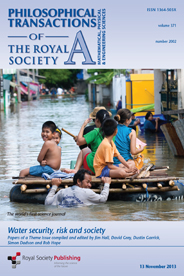 We are delighted to announce the publication of a themed issue of Philosophical Transactions of the Royal Society A, Water Security, Risk and Society.
We are delighted to announce the publication of a themed issue of Philosophical Transactions of the Royal Society A, Water Security, Risk and Society.
Recognising the need for interdisciplinary science to respond to unprecedented water security challenges, the University of Oxford organised the international conference on Water Security, Risk and Society in April 2012. The conference convened 200 leading thinkers from science, policy and enterprise in 30 countries to take stock of the scientific evidence on water security risk and prioritise future interdisciplinary research.
This agenda-setting themed issue includes eight papers from Oxford University authors and engages multiple dimensions of water security, ranging from drinking water, food production and energy to climate risks, transboundary rivers and economic growth. Risk provides the basis for a unifying framework to bridge across multiple disciplines and science-policy divides.
Fifteen papers are organised in three sections to: frame the policy challenges and scientific responses to water security from a risk perspective; assess the evidence about the forces driving water insecurity; and examine responses to water insecurity at multiple scales. This includes an article by Dr. Karen Bakker:
Karen Bakker and Cynthia Morinville (2013). The governance dimensions of water security: a review Phil. Trans. R. Soc. A November 13, 2013 371 20130116; doi:10.1098/rsta.2013.0116
The papers demonstrate the growing scale of water security risks. For example, over 45% of the global population is projected to be exposed to water shortages for food production by 2050 (Falkenmark), and South American cities have experienced a doubling of risks associated with extreme rainfall from 1960-2000 (Vorosmarty). Modelling demonstrates that climate hazards are an impediment to economic growth (Brown). Taken together, these papers provide strong justification and strategic priorities for policy-driven science in the lead up to new development goals in 2015 and beyond.
For more information on the themed issue click here.
